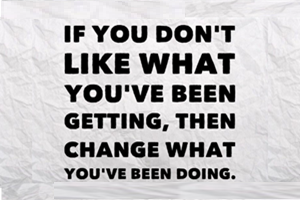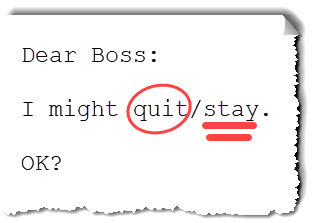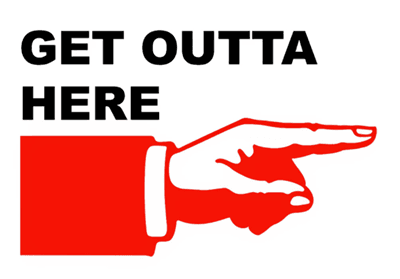Question
Your interviewing techniques worked too well and now I have two exciting job offers! Based on your suggestions about how to choose an employer, I have evaluated the people, the product and the companies’ reputations and I have accepted one of the offers. Your advice on how to resign properly was great, too – it went without a hitch.
Now, what is the best way to decline the other offer? I would like to avoid a lot of “why” questions, because my reasons are mostly due to the reputation of the company I want to join, and I “clicked” better with the manager who would be my boss. Thanks for your advice.
Nick’s Reply
 I’m glad to hear my suggestions helped you win a new job and resign an old one – I love to hear success stories. You’re welcome, and thanks for your very kind words. Congratulations on getting two offers! Nowadays that’s quite an accomplishment.
I’m glad to hear my suggestions helped you win a new job and resign an old one – I love to hear success stories. You’re welcome, and thanks for your very kind words. Congratulations on getting two offers! Nowadays that’s quite an accomplishment.
Your wish to avoid a discussion about “why” you’re turning down a job offer is understandable. Let’s talk about a prudent and safe way to do it.
Decline a job offer via phone
The right way to turn down one of the offers is on the phone, not via e-mail. Despite the cold, impersonal ways most HR departments behave when they reject you, you should cultivate a higher standard.
Make the call to the manager who offered the job, not to the HR department. Awkward though it might seem to you, it’s important to take responsibility for your decision and to tell the manager yourself. This is a manager who wants to hire you and who could serve as a reference for you one day when you need one, or who might hire you in the future. This is the kind of relationship you want to cultivate and protect. So make the conversation personal and as positive as you can.
Decline a job offer concisely, politely and firmly
How to Say It
“I’ve thought about the offers I received very carefully. The opportunity to work with you means a lot to me. However, after careful consideration I’ve decided that another job with a different company is more suitable to my goals at this point in my career. So, I must respectfully decline your offer. But I want to thank you very much for your faith in my abilities. I hope at some time in the future we get a chance to work together.”
That’s it. If they press you, you can decline to discuss details just as politely and respectfully.
How to Say It
“It’s a better fit for me. There’s really not anything else I can tell you. Thanks again for the offer.”
Never disclose where you’re going
The less you say, the better. What if they ask who the other company is? Never disclose that, simply because it’s not their business. It’s rare, but I’ve seen companies try to torpedo job offers from their competitors.
How to Say It
“I’d prefer not to divulge the name of the other company because I don’t think it’s appropriate to do so until I am actually working there. Once I’m settled in, I’d be glad to get in touch.”
If you’re both local, you might even suggest meeting for breakfast or coffee. I’m not kidding — handled deftly, the manager becomes a friend, a reference or even a future boss. I’d never waste an opportunity to form a new business relationship. But let some time pass — get in touch after you’ve been at your new job at least a month.
Be brief and professional
In my opinion, you are required to be polite and professional. It ends there. You are not obligated to explain “why” if you don’t want to. If they get pushy, just thank them again and gently hang up the phone.
If my suggestions sound a bit unexpected, consider what happens when a company rejects a job candidate. The rejection is usually cold and impersonal. The candidate is left hanging and upset because the company does nothing to show respect or to maintain a relationship. That’s why it’s important to rise above the impersonal so you will be remembered positively. I wish more companies would do the same!
There’s one special thing you can do if you’d really like to leave the door open for future contact. If you like the company and manager well enough, even if they’re not right for you, suggest another good candidate. That’s a professional courtesy that goes a long way with some managers.
Enjoy your new job! My compliments to you.
How do you decline a job offer when you’ve got a better one?
: :




 I am an executive at a large U.S. bank. I was approached by a headhunter and have had serious and positive discussions with a company he represents. We were at the next stage of me speaking with the CEO of the company. However, it turns out that the company is a business client of my bank and the CEO of the company is good friends with my boss. On account of this, the CEO is not comfortable meeting with me. The headhunter informed me that the CEO has asked me to resign or notify my boss of my intention to resign before he will meet with me and resume discussions. While they have indicated that they would then “fast track” the process immediately after that, it’s not a guaranteed offer. This seems absurd to me. The headhunter tells me this is not unusual at my high level, but I have never heard of such a practice. What are your thoughts?
I am an executive at a large U.S. bank. I was approached by a headhunter and have had serious and positive discussions with a company he represents. We were at the next stage of me speaking with the CEO of the company. However, it turns out that the company is a business client of my bank and the CEO of the company is good friends with my boss. On account of this, the CEO is not comfortable meeting with me. The headhunter informed me that the CEO has asked me to resign or notify my boss of my intention to resign before he will meet with me and resume discussions. While they have indicated that they would then “fast track” the process immediately after that, it’s not a guaranteed offer. This seems absurd to me. The headhunter tells me this is not unusual at my high level, but I have never heard of such a practice. What are your thoughts?
 The easy answer would be that you’ve just been unlucky and that you got caught in a series of unfortunate downsizings through no fault of your own. But that would make for a very short column.
The easy answer would be that you’ve just been unlucky and that you got caught in a series of unfortunate downsizings through no fault of your own. But that would make for a very short column.
 I left a decent-size company for a start-up some time ago. Like any other start-up, the work requires a lot of hours. The work itself is very challenging and truly leading-edge technology. However, since the birth of my daughter, I’ve realized that I’m much more of a family man than I imagined. I can clearly see that the hours will only get worse as time goes on.
I left a decent-size company for a start-up some time ago. Like any other start-up, the work requires a lot of hours. The work itself is very challenging and truly leading-edge technology. However, since the birth of my daughter, I’ve realized that I’m much more of a family man than I imagined. I can clearly see that the hours will only get worse as time goes on. I finally landed my next job after months of interviews. Now I don’t want to blow it until I’m actually on board at the new company. I say that because the last time I changed jobs I made the mistake of telling my boss too soon, before I even had a job offer. I thought he respected me enough to wish me well, but it blew up in my face. He told HR and I was walked out the door. I can use some advice. How should I handle it this time?
I finally landed my next job after months of interviews. Now I don’t want to blow it until I’m actually on board at the new company. I say that because the last time I changed jobs I made the mistake of telling my boss too soon, before I even had a job offer. I thought he respected me enough to wish me well, but it blew up in my face. He told HR and I was walked out the door. I can use some advice. How should I handle it this time?
 Nick’s Reply
Nick’s Reply
 An employee quit without notice after five months. Her explanation was that she never wanted to stay at this job from the start. We paid a hefty agency fee for this person. She never signed any paperwork with the agency, and the contract stated that employment is “at will.”
An employee quit without notice after five months. Her explanation was that she never wanted to stay at this job from the start. We paid a hefty agency fee for this person. She never signed any paperwork with the agency, and the contract stated that employment is “at will.” We had a candidate go through the interview process and the offer cycle at our company. He took a position for a week, then returned to his other job. He never gave notice to his other employer, just took vacation time. After working the week, he didn’t return. It took a couple of days to track him down at his old work number. Is this common?
We had a candidate go through the interview process and the offer cycle at our company. He took a position for a week, then returned to his other job. He never gave notice to his other employer, just took vacation time. After working the week, he didn’t return. It took a couple of days to track him down at his old work number. Is this common?